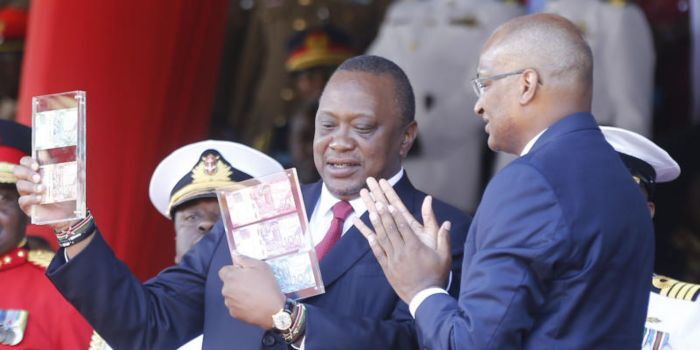

Central Bank of Kenya (CBK), on Friday, June 9, released a report demonstrating how the 2019 demonetisation of 1,000 Kenya Shillings notes affected the economy.
CBK noted that the decision to change the currency was informed by the need to address certain issues, such as combatting inflation, cracking down on counterfeit money, and raising revenue.
In the report, signed by the outgoing governor Patrick Njoroge, CBK revealed that the directive enforced by Retired President Uhuru Kenyatta yielded expected fruits and met its objective.
"The success of the exercise can be measured in several ways. First, the exercise was completed within the set timeline of four months, with the complete changeover to the new notes in that period.
Second, as witnessed in other countries, the exercise was not disruptive to the economy, as key macroeconomic indicators such as inflation and exchange rates remained stable.
"Third, the exercise impacted IFFs, as indicated by the notes valued at Ksh7.386 billion, which were rendered worthless at the end. This was due to noncompliance with the robust anti-money laundering (AML) and combating financing of terrorism (CFT) checks in place," read part of the report.
The report stated that the exercise carried out between June 1 to September 30, 2019, addressed concerns regarding illicit financial flows (IFFs) and the emergence of counterfeit banknotes that threatened the currency's integrity.
Central Bank of Kenya explained that it managed to contain illicit financial flows, mainly funds sourced from proceeds of commercial tax evasion, revenues from criminal activities, and public corruption.
The report noted that the success of the exercises hinged on a gradual process, strong engagement with key stakeholders, an extensive public awareness campaign, and a robust framework.
"The gradual process allocated adequate time for withdrawal of the banknotes. The four-month timeline ensured a smooth conversion and adjustment to the new currency across the country, and sufficient time for addressing logistics such as transportation, recalibration of cash machines to the new currency by banks and businesses, and for people to learn the features of the new notes," read part of the report.
Demonetisation also helped reduce the amount of money in circulation, leading to a stronger currency and robust export market.
The report also observed instances when demonetisation led to the disruption of business operations, especially, due to lack of awareness among some traders.
However, CBK noted that there was minimal disruption because banks worked closely with the Central Bank to ensure that there was an adequate supply of the new notes in all their branches across the country, and to facilitate the exchange of the old banknotes with new ones in line with the indicated guidelines.
Coordination of the process was extended to the East Africa region, to ensure that possible illicit financial flows (IFFS) outside the borders do not return to Kenya’s financial system through banks in the region.
CBK stated that in many instances, whenever posters or pamphlets were distributed, the staff remained in the area to carry out face-to-face discussions with the public during the week and the weekends.
"Completion of the process within the set timelines eliminated uncertainties. The continuous engagements with key stakeholders during the exercise ensured that currency shortages across the country were limited.
"After the launch of the new banknotes and announcement to demonetise the notes, CBK held meetings with CEOs of commercial banks and other relevant institutions to ensure a smooth demonetisation process," the report read in parts.
|